| Listing 1 - 10 of 32 | << page >> |
Sort by
|
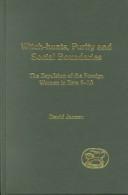
ISBN: 1841272922 9781841272924 Year: 2002 Volume: 350 Publisher: Sheffield Sheffield academic press
Abstract | Keywords | Export | Availability | Bookmark
 Loading...
Loading...Choose an application
- Reference Manager
- EndNote
- RefWorks (Direct export to RefWorks)
Ethnology in the Bible. --- Bible. --- Criticism, interpretation, etc. --- Ethnology in the Bible --- 222.7 --- Kronieken. Ezra. Nehemia --- Esdras B --- Esdras (Book 1, Vulgate) --- Esra (Book of the Old Testament) --- Ezra (Book of the Old Testament)
Book
ISBN: 0884141632 9780884141631 9781628371390 Year: 2016 Publisher: Atlanta
Abstract | Keywords | Export | Availability | Bookmark
 Loading...
Loading...Choose an application
- Reference Manager
- EndNote
- RefWorks (Direct export to RefWorks)
"Donna Laird examines Ezra and Nehemiah in the light of modern sociological theorist Pierre Bourdieu. How did this context of hardship, exile, and return change what Ezra and Nehemiah viewed as important? How did they define who was a part of their community, and who was an outsider? It goes on to explore how the books engaged readers at the time: how it addressed their changing circumstances, and how different groups gained and used "social power," or the ability to influence society"--
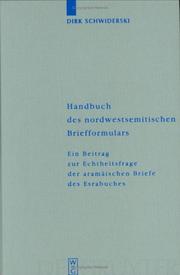
ISBN: 3110168510 1306276098 3110812339 9783110168518 Year: 2000 Volume: 295 Publisher: Berlin Walter de Gruyter
Abstract | Keywords | Export | Availability | Bookmark
 Loading...
Loading...Choose an application
- Reference Manager
- EndNote
- RefWorks (Direct export to RefWorks)
A formgeschichtlich study of the Hebrew and Aramaic letters of the Old Testament and its environment (9th century BCE to 2nd century CE) presenting a history of the genre of the northwest Semitic epistolary form, including the Babylonian-Assyrian, demotic and Greek epistolary form of the first millennium, as well as a form criticism of the Aramaic letters of the book of Ezra (the question of authenticity). Die hier vorgelegte formgeschichtliche Untersuchung der hebräischen und aramäischen Briefe des Alten Testaments und seiner Umwelt ( 9. Jh. v. Chr. bis 2. Jh. n. Chr. ) bietet eine Gattungsgeschichte des nordwestsemitischen Briefformulars (unter Einbeziehung des babylonisch-assyrischen, demotischen und griechischen Briefformulars des 1. Jahrhunderts) sowie eine Formkritik der aramäischen Briefe des Buches Esra (Echtheitsfrage).
222.7 --- Kronieken. Ezra. Nehemia --- Semitic letters --- History and criticism --- Bible. O.T. Ezra --- Criticism, interpretation, etc --- Aramaic letters --- Jewish letter writing. --- Aramaic letters. --- Bible. --- Criticism, Textual. --- Aramaic literature --- Letter writing --- Esdras B --- Esdras (Book 1, Vulgate) --- Esra (Book of the Old Testament) --- Ezra (Book of the Old Testament)
Book
ISBN: 0802823629 9780802823625 Year: 1982 Publisher: Grand Rapids (Mich.): Eerdmans
Abstract | Keywords | Export | Availability | Bookmark
 Loading...
Loading...Choose an application
- Reference Manager
- EndNote
- RefWorks (Direct export to RefWorks)
Bible. --- Commentaries. --- 222.7 --- #GROL:SEMI-222.7 --- Kronieken. Ezra. Nehemia --- Esdras (Book 2, Vulgate) --- Nehemiah (Book of the Old Testament) --- Neḥemyah (Book of the Old Testament) --- Esdras B --- Esdras (Book 1, Vulgate) --- Esra (Book of the Old Testament) --- Ezra (Book of the Old Testament)
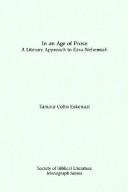
ISBN: 1555402607 1555402615 9781555402600 9781555402617 Year: 1988 Volume: 36 Publisher: Atlanta Scholars Press
Abstract | Keywords | Export | Availability | Bookmark
 Loading...
Loading...Choose an application
- Reference Manager
- EndNote
- RefWorks (Direct export to RefWorks)
Bible. --- Criticism, interpretation, etc. --- 222.7 --- Kronieken. Ezra. Nehemia --- Esdras (Book 2, Vulgate) --- Nehemiah (Book of the Old Testament) --- Neḥemyah (Book of the Old Testament) --- Esdras B --- Esdras (Book 1, Vulgate) --- Esra (Book of the Old Testament) --- Ezra (Book of the Old Testament)
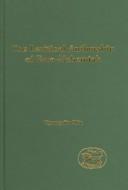
ISBN: 0567082261 9780567082268 Year: 2004 Volume: 409 Publisher: London Clark
Abstract | Keywords | Export | Availability | Bookmark
 Loading...
Loading...Choose an application
- Reference Manager
- EndNote
- RefWorks (Direct export to RefWorks)
The study of Ezra-Nehemiah has been revolutionized in recent years by a growing rejection of the long-established belief that it was composed as part of the Chronicler's work. That shift in scholarly paradigms has re-opened many questions of origin and purpose, and this thesis attempts to establish an answer to the most important of these: the question of authorship. Here, Kyungjin Min argues that Ezra-Nehemiah most likely originated in a Levitical group that received Persian backing during the late-fifth century BCE and that valued the ideologies of decentralization of power, unity and cooper
Levites. --- Bible. --- Criticism, interpretation, etc. --- Bible. O.T. Ezra -- Criticism, interpretation, etc. --- Bible. O.T. Nehemiah -- Criticism, interpretation, etc. --- Levites --- Religion --- Philosophy & Religion --- Judaism --- 222.7 --- Kronieken. Ezra. Nehemia --- Esdras (Book 2, Vulgate) --- Nehemiah (Book of the Old Testament) --- Neḥemyah (Book of the Old Testament) --- Esdras B --- Esdras (Book 1, Vulgate) --- Esra (Book of the Old Testament) --- Ezra (Book of the Old Testament)
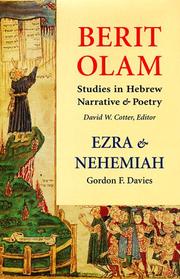
ISBN: 081465049X 9780814650493 Year: 1998 Publisher: Collegeville Liturgical Press
Abstract | Keywords | Export | Availability | Bookmark
 Loading...
Loading...Choose an application
- Reference Manager
- EndNote
- RefWorks (Direct export to RefWorks)
222.7 --- Kronieken. Ezra. Nehemia --- Bible --- Criticism, interpretation, etc --- Bible. --- Esdras (Book 2, Vulgate) --- Nehemiah (Book of the Old Testament) --- Neḥemyah (Book of the Old Testament) --- Esdras B --- Esdras (Book 1, Vulgate) --- Esra (Book of the Old Testament) --- Ezra (Book of the Old Testament) --- Criticism, interpretation, etc.
Book
ISBN: 9789042935303 9042935308 Year: 2018 Volume: 13 Publisher: Leuven Peeters
Abstract | Keywords | Export | Availability | Bookmark
 Loading...
Loading...Choose an application
- Reference Manager
- EndNote
- RefWorks (Direct export to RefWorks)
"This book is one of the first modern collections of studies on important aspects of the Ezra figure that combines both Jewish and Christian traditions. The volume opens with a study of Ezra in rabbinic literature and continues with four chapters on 4 Ezra, discussing its dimensions of time, future agents and visionary practices as well as reminiscences of 4 Ezra in the Armenian Script of the Lord's Infancy. The following chapters study the relationship of 4, 5 and 6 Ezra, the nature of 5 Ezra and dissimulation strategies in 6 Ezra. The last chapters concentrate on the important discovery in 1984 of a longer version of the Vision of Ezra. Studies of its place, date, tour of hell as well as its scheme of atonements make a start with integrating this text in the study of early Christianity. Analyses of the Apocalypse of Sedrach and of anxieties of discontinuity in the Testament of Abraham and in Ezra traditions further contribute to a better understanding of this text. The final chapter offers the first German translation of this exciting discovery. As has become customary, the volume concludes with an extensive bibliography and detailed index."--Publisher's website.
222.7 --- 222.7 Chroniques. Esdras. Nehemie --- 222.7 Kronieken. Ezra. Nehemia --- Chroniques. Esdras. Nehemie --- Kronieken. Ezra. Nehemia --- Ezra --- Esdra --- Esdras --- Esras --- Esrei --- Esri --- Ezdras --- Ezrah --- Ezri --- Iezraa --- ʻUzayr --- עזרא --- Bible. --- Apocrypha --- Esdras B --- Esdras (Book 1, Vulgate) --- Esra (Book of the Old Testament) --- Ezra (Book of the Old Testament) --- Criticism, interpretation, etc. --- Ezra, --- Ezra - (Biblical figure)
Book
ISBN: 9789042937697 9042937696 9789042937703 904293770X Year: 2018 Publisher: Leuven Peeters
Abstract | Keywords | Export | Availability | Bookmark
 Loading...
Loading...Choose an application
- Reference Manager
- EndNote
- RefWorks (Direct export to RefWorks)
Back cover: The biblical books Ezra and Nehemiah are not highly regarded because of a painful point. In both books, a call can be found to put an end to marriages with foreign, or strange women. This commentary wants to understnad that summons in the context of the world at that time and to show that other themes play a role in Ezra and Nehemiah. In the time after the return from the Babylonian exile Israel had to search for a new identity. It was found around the temple and from the Torah of Moses which was appropriated for a new era.
Bible. --- Commentaries. --- 222.7 --- 222.7 Chroniques. Esdras. Nehemie --- 222.7 Kronieken. Ezra. Nehemia --- Chroniques. Esdras. Nehemie --- Kronieken. Ezra. Nehemia --- Esdras (Book 2, Vulgate) --- Nehemiah (Book of the Old Testament) --- Neḥemyah (Book of the Old Testament) --- Esdras B --- Esdras (Book 1, Vulgate) --- Esra (Book of the Old Testament) --- Ezra (Book of the Old Testament) --- Exegese Oude Testament --- Tekstverklaring --- Historische boeken
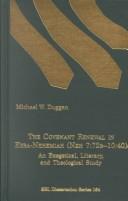
ISBN: 1589830148 9781589830141 Year: 2001 Volume: 164 Publisher: Atlanta Society of Biblical Literature
Abstract | Keywords | Export | Availability | Bookmark
 Loading...
Loading...Choose an application
- Reference Manager
- EndNote
- RefWorks (Direct export to RefWorks)
Covenants --- Biblical teaching. --- Bible. --- Criticism, interpretation, etc. --- 222.7 --- Biblical teaching --- Kronieken. Ezra. Nehemia --- Esdras (Book 2, Vulgate) --- Nehemiah (Book of the Old Testament) --- Neḥemyah (Book of the Old Testament) --- Esdras B --- Esdras (Book 1, Vulgate) --- Esra (Book of the Old Testament) --- Ezra (Book of the Old Testament) --- Covenants - Biblical teaching.
| Listing 1 - 10 of 32 | << page >> |
Sort by
|

 Search
Search Feedback
Feedback About UniCat
About UniCat  Help
Help News
News